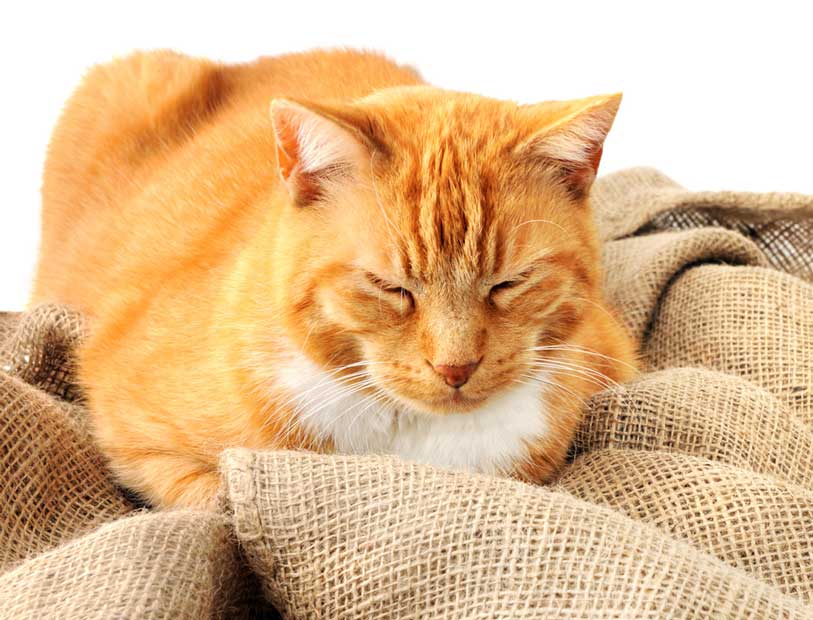Arthritis in Cats

Arthritis, also known as degenerative joint disease (DJD), can occur in cats just as it does in dogs and people. It can easily go unnoticed because cats naturally hide pain and infirmity.
What Is Feline Arthritis?
Arthritis occurs when the cartilage that cushions the ends of bones breaks down. This can be the result of an injury, an infection, or simply chronic wear and tear. Hip dysplasia, a common congenital cause of dog arthritis, also occurs in cats. Obesity makes cats more susceptible to joint problems, as well. Arthritis in the toes is extremely common in cats that are declawed.
Normally, a layer of cartilage in the joint allows for smooth, frictionless motion. With arthritis, the cartilage gets damaged and ultimately wears away, exposing the sensitive bone underneath. Pain, inflammation, and stiffness are the results. The joint loses its stability. This causes more pain and stiffness. Arthritis can happen in any joint in the cat's body including the shoulders, elbows, hips, knees, paws, and spine. Arthritis is not curable, and it is progressive, meaning that it gets worse over time.
Signs of Arthritis in Cats
The signs of arthritis in cats may be subtle and progress over time. Don't expect your cat to cry out in pain. Some cats will act stiff, start limping, or favor one leg. Signs are often worse when the cat first wakes up. She may be slow to get up and down from a resting position. She may hesitate before jumping onto a chair or a windowsill that she easily reached before, or she could stop jumping altogether. Some arthritic cats eliminate over the edge of the litter pan because squatting is too uncomfortable. Others start going outside of the box entirely because it's too hard for them to get in and out of it.
An arthritic cat may seem to be "slowing down," or acting less playful, signs that are often dismissed as normal aging. She may become withdrawn or cranky and resent being touched near the affected areas. Joint swelling may be visible in the lower legs. Cold and damp conditions make arthritis worse. An arthritic cat may seek warm, soft places for comfort.
Diagnosis of Feline Arthritis
Your veterinarian will start by taking a complete history from you and performing a thorough physical exam, including careful evaluation of the joints. X-rays can help confirm the diagnosis of arthritis and rule out more serious problems such as tumors or broken bones. Your veterinarian may sample joint fluid with a needle to rule out more unusual causes of lameness. Additional testing such as bloodwork and urinalysis may be recommended to make sure your cat is not acting slow or withdrawn for another health reason.
Management of Arthritis in Cats
Weight management is essential for arthritic cats. Getting your cat to slim down will lessen the strain on damaged joints. Controlling food portions and reducing treats can help a cat lose weight. For further dietary advice, consult your veterinarian.
Try to make your cat's life as easy as possible by allowing easy access to food, water, and the litter pan. A large, low-sided litter box on the level of the home where your cat spends the most time is a must. Provide your cat with soft, warm sleeping places that she can easily reach. Steps or a ramp may be useful.
Medications for Arthritis in Cats
Most human painkillers, especially acetaminophen (Tylenol®), are highly toxic to cats and must never be used. Many medications used to treat pain in dogs are unsafe for cats as well. However, your veterinarian may be able to recommend some safe alternatives tailored to your arthritic cat's needs. These may include:
- Glucosamine-chondroitin supplements. This class of drugs slows progression of disease by strengthening joint surfaces. They may help with pain control, especially in the early stages of the process. Examples include Cosequin® and Adequan®.
- Omega fatty acid supplements. Fatty acids, such as those contained in salmon or flaxseed oils, are natural anti-inflammatories that may provide mild pain relief to an arthritic cat.
- Meloxicam. Also known as Metacam® and originally marketed for dogs, this non-steroidal anti-inflammatory (NSAID) has shown promise in treating chronically painful cats. Kidney and liver side effects are possible, so careful dosing is essential.
- Gabapentin, Tramadol, and buprenorphine are some additional medications that your veterinarian may prescribe to help alleviate your cat's arthritis pain.
Often, arthritis medications are prescribed in combination and at lower doses to avoid unwanted side effects. Cats are extremely sensitive to most medications. Never give your cat a medication that was not specifically prescribed by your veterinarian.
Alternative Therapies for Feline Arthritis
Some areas of the country now have specialized clinics for pets that offer therapeutic massage, chiropractic, acupuncture, and even aqua-therapy. Your veterinarian may be able to provide a referral. Physical therapy is something you can do at home. It might be as simple as performing gentle massage or flexion/extension exercises. Consult your veterinarian for specific recommendations.
Prognosis for Arthritis in Cats
Arthritis isn't curable, but with proper care, arthritic cats can enjoy a good quality of life for many years to come.
You May Also Like These Articles:
You Love Spoiling Your Cat, but Should You?
Will My Cat Love Me Less If I Feed Her Less?
Are You Shortening Your Cat's Life? - Slideshow
How to Decide on an Indoor or Outdoor Lifestyle for Your Cat
Feliway - A Useful Tool to Help Treat Stress in Cats
Cat Kneading: Why Do Cats Do It and What Do People Call It?
Notice: Ask-a-Vet is an affiliated service for those who wish to speak with a veterinary professional about their pet's specific condition. Initially, a bot will ask questions to determine the general nature of your concern. Then, you will be transferred to a human. There is a charge for the service if you choose to connect to a veterinarian. Ask-a-Vet is not manned by the staff or owners of CatHealth.com, and the advice given should not delay or replace a visit to your veterinarian.






